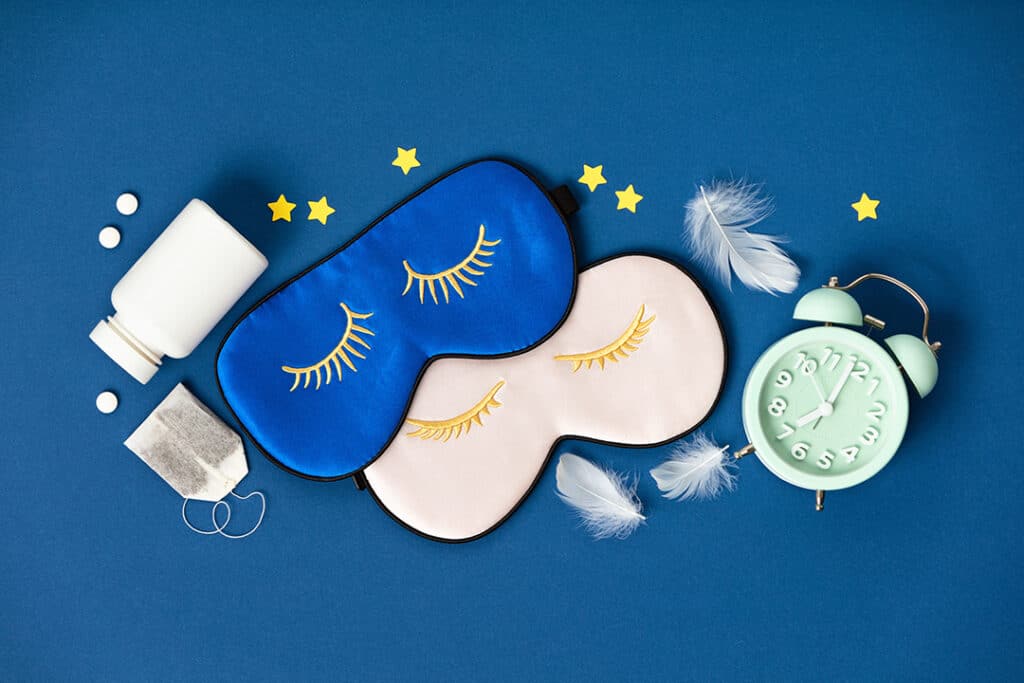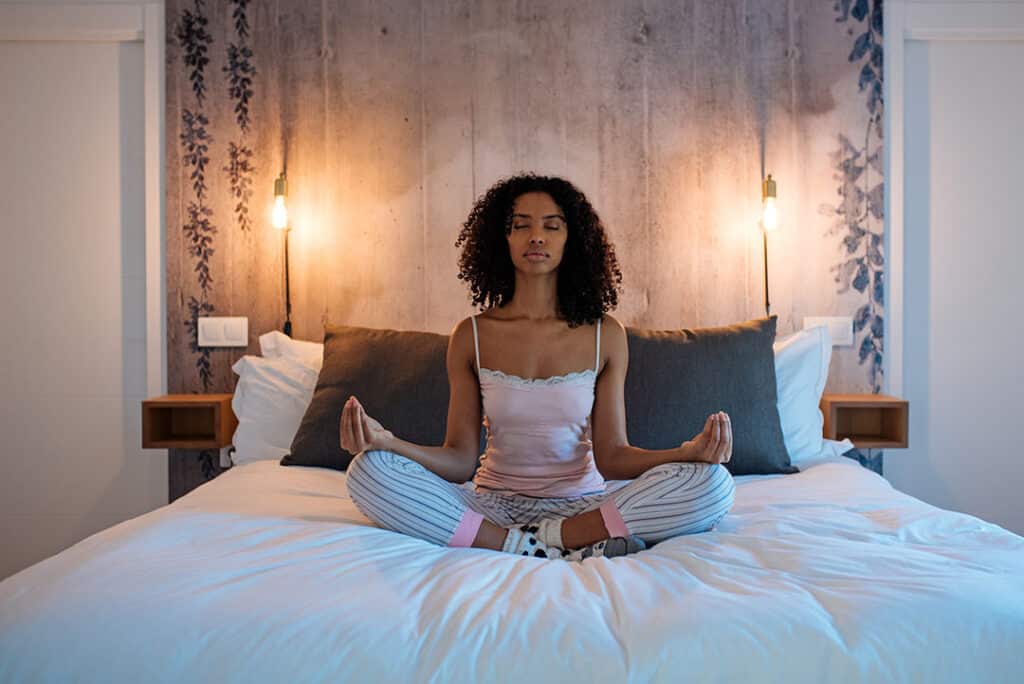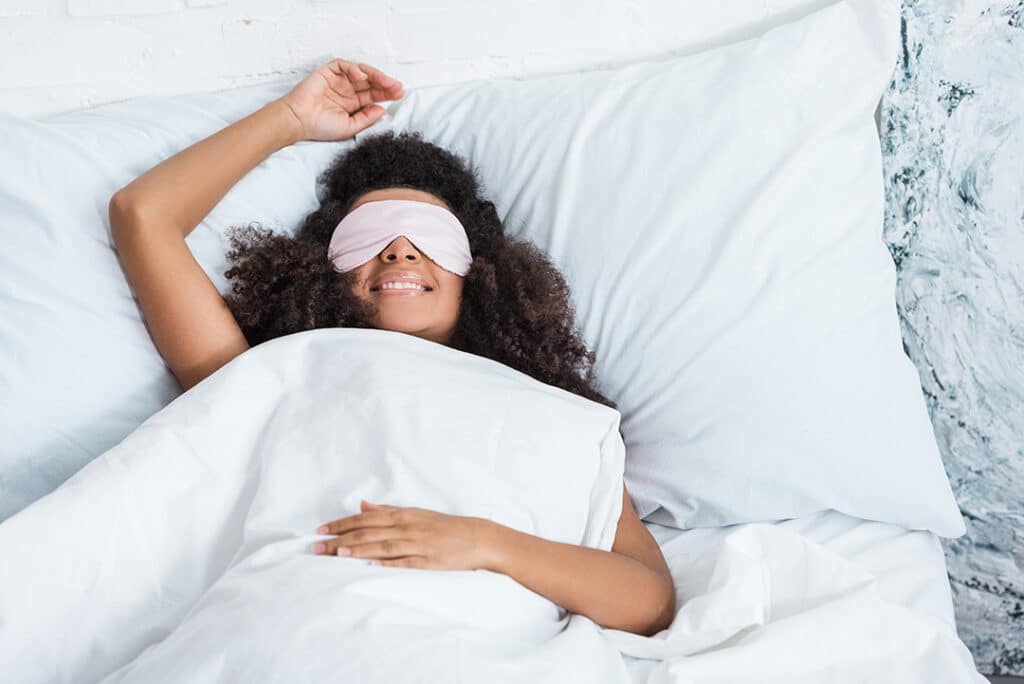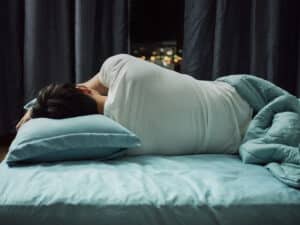Improve your sleep hygiene habits with these easy-to-do bedroom, nutrition, and mind-body tips.
When you think of improving your health, exercise and diet probably come to mind first. While these are effective strategies, have you considered that better sleep might be the key to feeling your best?
Quality sleep is crucial for enhancing health, mood, and productivity. Unfortunately, millions struggle to achieve it. Whether it’s racing thoughts, nighttime pain, or sleep apnea, there are countless challenges that prevent us from getting the restorative sleep we need.
The good news? Even those who consider themselves “bad sleepers” can improve. By adopting better habits, tips, and routines, anyone can boost their sleep quality and overall health. This approach is known as sleep hygiene—a collection of practices designed to help you get the best sleep possible.
But sleep hygiene isn’t just about what happens right before bed. It encompasses your habits, behaviors, and environment throughout the entire day. By making small, intentional changes, you can set the stage for restful, rejuvenating sleep that leaves you feeling your best.
Ready to improve your sleep hygiene and unlock the benefits of better rest?
What is Sleep Hygiene?

“Sleep hygiene” might sound like keeping your sheets clean, but it’s so much more. This concept refers to the habits and practices that promote regular, good quality sleep.
Having good sleep hygiene means creating an environment and establishing routines that encourage consistent, uninterrupted sleep. For instance, sticking to a consistent sleep schedule, creating a comfortable sleeping environment, and managing stress effectively are all good sleep hygiene practices.
On the other hand, bad sleep hygiene could be erratic sleep patterns, consuming caffeine late in the day, or spending too much time on screens before bed.
“When it comes to sleep, the little things matter. Your habits, your environment, and your stress levels all work together to determine how well you rest. At AlignLife, we help you build a lifestyle that supports your body’s natural rhythms—because great sleep doesn’t just happen by chance.”
- Dr. Jake Koziel, AlignLife Beech Grove, IN Chiropractor
Why is Sleep Hygiene So Important?
Setting yourself up for sleep success starts long before you crawl under the covers. The habits we develop during our waking hours significantly impact our ability to rest well – and live well.
Sleep hygiene plays a huge role in both our physical and mental health. Poor sleep has been proven to contribute to a range of health issues, including weakened immune function, increased stress levels, weight gain, and even chronic conditions like heart disease and diabetes.
Poor sleep significantly impacts your mental health too – a lack of sleep or poor quality sleep has been linked to impaired brain function, poor memory, emotional instability, and mood disorders like anxiety and depression.
On the flip side, having good sleep hygiene keeps you resilient, healthy, and active. Those who get quality sleep are better equipped to maintain a healthy weight, avoid chronic diseases, have a robust immune system, age slower, and enjoy mental clarity and positive moods.
While these long-term effects of sleep hygiene are important, let’s not forget the day-to-day benefits of prioritizing sleep. Feeling well-rested, energized, and focused means you’ll have more “good days” and simply enjoy life more.
24 Sleep Hygiene Tips for Better Rest
Achieving great sleep doesn’t require a miracle cure or secret ritual—it’s about building a lifestyle that supports both healthy activity and restful downtime. Here are our top tips to improve your sleep hygiene and get the quality sleep you need to thrive:
Bedroom Tips for Better Sleep

1) Make your bedroom a relaxing sanctuary.
Your bedroom sets the mood for your sleep quality. When your bedroom is a comfortable and serene space, your brain gets the message that it’s time to sleep. But if your bedroom is full of clutter, work items, bright lights, storage bins, or other distractions, you may be training your brain to be stimulated and alert. Remove any objects from your bedroom that aren’t dedicated to the art of sleeping to make you feel instantly more relaxed and at ease.
2) Invest in quality bedding and sleepwear.
Comfort is key when it comes to sleep. Investing in high-quality, breathable bedding and sleepwear can make a significant difference. Natural fibers like cotton, silk, or linen help regulate body temperature and wick away moisture, keeping you comfortable throughout the night. These can also keep you from getting overheated, sweating, or itchy.
3) Choose the right pillow.
A good quality pillow should support your neck and spine in a neutral position. Whether you prefer memory foam, feather, or another material, finding the right pillow can prevent neck pain, improve your posture, and help you sleep through the night.
4) Keep your bedroom cool.
Studies show that a cooler room temperature promotes better sleep. Your body temperature naturally drops during sleep, and a cool environment can help facilitate this process which helps you fall asleep faster. How cool should you go? Aim to keep your bedroom around 60-67°F (15-19°C), which is believed to be the optimal temperature for sleeping.
5) Keep your bedroom dark.
Light can disrupt your sleep by interfering with melatonin production. If city lights, street lamps, or other light sources stream into your bedroom, consider using blackout curtains to block it out, or try a sleep mask. Try to avoid using digital clocks or other tech with bright lights in your bedroom. Dimming the lights an hour before bed can also signal to your body that it’s time to wind down.
6) Reduce noise levels.
Unwanted noise is one of the most common reasons people lose sleep. From snoring partners to outdoor noises, these disruptions aren’t just frustrating – they can keep you from going into the deep restorative sleep you need. To help, use earplugs, a white noise machine, or a fan to create a constant, soothing background noise that drowns out other sounds. This can help you fall asleep faster and stay asleep longer.
7) Keep your bedroom for sleep and intimacy only.
Your bed is a sacred space. Using your bedroom only for sleep and intimacy helps strengthen the mental association between your bed and sleep. While it may seem like a simple luxury to work, watch TV, or eat in bed, it’s best to avoid these habits if you want your brain to associate your bed with turning off and going to sleep.
8) Freshen up your bedroom.
A clean and fresh bedroom can make your sleeping environment more inviting. Regularly wash your bedding, vacuum the floors, and keep clutter to a minimum (plus, you’ll also keep allergies at bay). The scent of clean sheets and a tidy room can make bedtime something to look forward to as you settle in under the covers.
9) Use the power of aromatherapy.
Essential oils like lavender, chamomile, and jasmine don’t just smell nice; they’re powerful sleep aids (and can even boost your mood). These scents have been shown to promote relaxation and improve sleep quality. Try using essential oils in a diffuser, or sprinkle a few drops on your pillow.
“Better sleep starts with better balance—physically, chemically, and emotionally. That’s why we look at everything from your spinal alignment to your daily habits to help you reclaim the rest your body needs to heal and thrive.”
- Dr. Jake Koziel, AlignLife Beech Grove, IN Chiropractor
Nutrition Tips for Better Sleep

10) Limite your caffeine and alcohol intake.
If you aren’t getting enough sleep, it’s natural to turn to caffeine to get through the day, or a nightcap to help you wind-down. But, you may want to think twice about that afternoon coffee or evening cocktail. Caffeine can stay in your system for up to 12 hours, and while alcohol may help you fall asleep, it can disrupt your sleep cycle. Instead, try green tea for an energy boost – it does contain caffeine, but is moderated by its l-theanine content. In the evenings, swap your cocktail for a mocktail or relaxing herbal tea.
11) Eat earlier.
Timing is everything when it comes to eating for good sleep. A heavy meal late at night can wreak havoc on your sleep. Try to finish eating at least two to three hours before bed. If you’re hungry, opt for a light snack like a banana or a small handful of nuts.
12) Increase your magnesium.
Magnesium is a mineral that plays a key role in many body functions, including sleep regulation. It works by helping to reduce stress and promote relaxation. You can get more magnesium by eating foods like leafy greens, nuts, seeds, and whole grains. Or, consider taking a magnesium supplement like Aceva Triple Mag. This supplement provides three absorbable forms of magnesium to support everything from sleep to muscle cramps to blood sugar regulation.
Mind-Body Tips for Better Sleep

13) Develop a pre-sleep routine.
Wind down with a relaxing routine. Your brain needs time to shift from the active mode of daytime to the restful mode of nighttime. Rather than rush into bed, plan a 30-60 minute evening routine that includes relaxing activities like reading, taking a warm bath, or practicing gentle stretches. This signals that it’s time to relax and prepare for sleep.
14) Tackle your stress and anxiety.
Stress is one of the most common reasons people lose sleep, so getting a handle on stress is critical if you want to improve your sleep quality. Practice stress-reducing techniques like meditation, mindfulness, deep breathing, or journaling to help calm your mind before bed. If you’ve been struggling with chronic stress for a while, consider reaching out to your AlignLife chiropractor for help.
15) Exercise regularly.
Want to sleep better? Get moving! Regular physical activity has been shown to help you fall asleep faster and enjoy deeper sleep. Aim for at least 30 minutes of moderate exercise most days, but try to avoid vigorous workouts close to bedtime as they can be too stimulating. It’s also best to plan your workouts for the morning as exercising too late can energize you before bed.
16) Try progressive muscle relaxation.
This technique is a simple way to fall asleep when counting sheep just isn’t working. Progressive muscle relaxation involves tensing and then slowly relaxing each muscle group in your body, starting from your toes and working your way up. As your body lets go of physical tension, the brain relaxes and you’re more likely to fall into a deep sleep. Chiropractic care is also a great way to relieve muscle tension and help you get a better night’s sleep.
17) Wear socks to bed.
Did you know that cold feet can keep you from slipping into sleep? Cold feet slows or even restricts blood flow through your body, which can keep you from settling into sleep. Wearing socks to bed can help improve blood flow to your feet, and keeping them warm will make it easier to relax.
18) Try a warm bath or shower before bed.
A warm bath or shower isn’t just a relaxing way to end the day – this calming ritual can help your brain and body relax and prepare for sleep. When you get out of the bath or shower, your body’s core temperature drops, which mimics the natural drop in temperature during sleep (and shifts you into sleep mode).
19) Listen to relaxing music of sounds.
Calming music, nature sounds, sleep stories, or white noise can help create a soothing environment that promotes sleep. Consider using a sound machine or an app designed to help you relax.
20) Limit your exposure to stressful content before bed.
Ever struggle to fall asleep after watching a scary movie, reading the news, or catching up on social media? Watching or reading stressful or stimulating content before bed puts your brain into active mode and disrupts your natural sleep cycles. Instead, choose something light-hearted and relaxing (or boring!) to help calm your mind.
General Tips for Better Sleep

21) Get plenty of natural light during the day.
Natural light during the day helps regulate your sleep-wake cycle so you’re ready to drift off by nightfall. Aim for at least 30 minutes of outdoor time each day. Morning light is particularly powerful in boosting your mood and energy levels and preparing your body for a restful night ahead.
22) Keep a consistent sleep schedule.
Being a creature of habit can be a good thing. Going to bed and waking up at the same time every day helps set your internal clock and makes falling asleep on time a breeze. Sticking to your schedule (even on weekends) can make Monday mornings a little less painful.
23) Avoid napping late in the day.
While short naps can be beneficial, long or late-afternoon naps can interfere with nighttime sleep. If you need to nap, try to keep it under 30 minutes and do it earlier in the day.
24) Limit screen time before bed.
The blue light from screens can trick your brain into thinking it’s daytime. This suppresses your natural melatonin production and makes it harder to fall asleep when you want to. To fall into a better sleep rhythm, avoid all screens at least an hour before bed, or use blue light filters if you can’t part with your devices.
Signs of Poor Sleep Hygiene

Even with the best intentions, you may still be sabotaging your sleep without realizing it. Poor sleep hygiene can creep in subtly through everyday habits—and the results show up as grogginess, low mood, or chronic fatigue. Here are some of the most common signs that your sleep habits may need a reset:
You have trouble falling asleep—often.
If it regularly takes you more than 30 minutes to fall asleep, your mind and body may not be getting the right signals to transition into rest. This could be due to screen use before bed, high stress levels, caffeine too late in the day, or an inconsistent sleep schedule.
You wake up frequently during the night.
Waking up multiple times (and struggling to fall back asleep) is a hallmark of disrupted sleep hygiene. Common culprits include room temperature, light pollution, alcohol, anxiety, or even an unsupportive mattress or pillow.
You feel groggy even after 7–9 hours of sleep.
If you’re technically getting “enough” sleep but still wake up tired, the quality of your sleep may be poor. Factors like frequent awakenings, poor diet, or irregular sleep patterns can prevent you from getting deep, restorative sleep stages.
You rely on caffeine to get through the day.
A cup of coffee in the morning is fine—but if you’re reaching for energy drinks or coffee throughout the day just to function, your body may be running on poor sleep reserves.
You sleep much longer on weekends.
If you need to “catch up” on sleep every weekend, it’s a sign that your weekday habits aren’t giving your body the rest it needs. This inconsistency can throw off your internal clock and make it harder to sleep well long-term.
You feel moody, irritable, or anxious.
Mood swings, low patience, or difficulty concentrating can all be symptoms of poor sleep hygiene. Sleep is critical for brain function and emotional regulation—and if your sleep is lacking, your mental health may suffer too.
You snore or gasp during sleep.
Loud snoring, choking, or gasping during sleep can be signs of a more serious sleep disorder like obstructive sleep apnea. Poor sleep hygiene may exacerbate these symptoms, but they should also be evaluated by a healthcare provider.
You have trouble waking up on time.
Hitting snooze multiple times or sleeping through alarms often means your circadian rhythm is out of sync—commonly caused by late-night screen time, irregular sleep schedules, or insufficient light exposure during the day.
Find Your Sleep Solution

Getting a good night’s sleep isn’t a luxury —it’s a necessity for our well-being. If you aren’t getting the high-quality sleep you need, prioritizing sleep hygiene with these tips can transform your nights from restless to restful.
If you’ve tried these tips and still struggle with sleep, it may be time to consult a healthcare professional. Sleep specialists can help you understand why you’re struggling to get enough sleep and recommend the most effective treatments for you.
At AlignLife, our team of chiropractors, functional nutritionists, and other integrative therapists can also help you identify the root causes of your sleep woes. whether that’s a physical misalignment, nutrient deficiencies, pain, or overwhelming stress.
Schedule a visit at an AlignLife center near you and get the rest you deserve!



